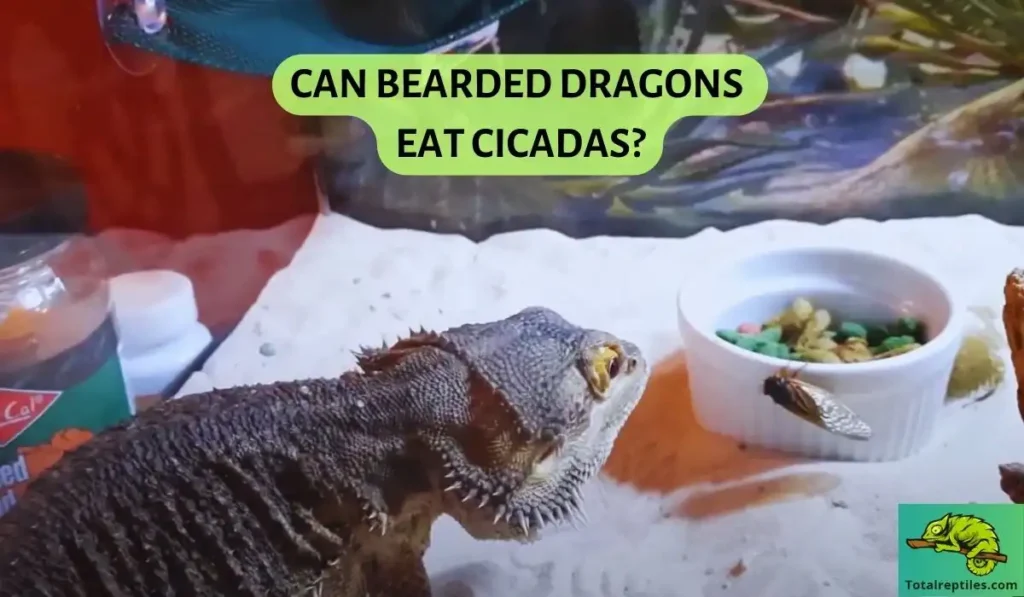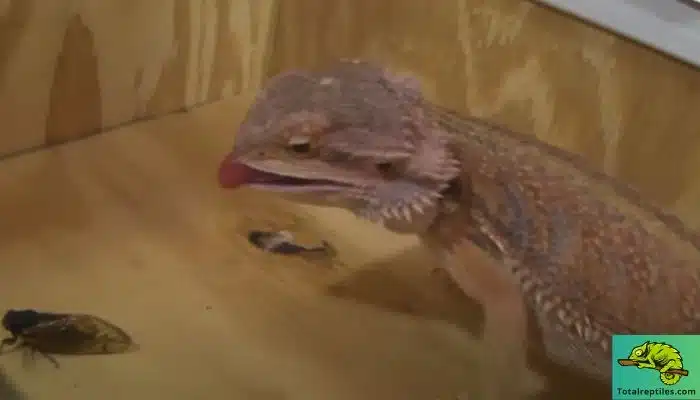Yes, your dragon’s dream comes true, with unlimited access to the delectable treats of Brood X cicadas. But, there are some issues.
Ensuring the safety of our lizards is of utmost importance. Ensure that the cicadas they consume do not come in contact with harmful lawn chemicals, fertilizers, or pesticides.
Furthermore, these insects possess a tough exterior shell, which can challenge digestion and potentially lead to gut impaction. To mitigate this risk, offering cicadas that have already shed their exoskeletons is best.
As a lover of a bearded dragons, I’ve discovered one thing for sure these magnificent creatures have an insatiable appetite. That’s why I was thrilled to learn that can bearded dragons eat cicadas?
So, while cicadas are a safe and protein-packed delight for our bearded dragons, let’s remember to acquire them from a reputable dealer rather than plucking them from our surroundings. Our dragons deserve only the best, after all.

Bearded Dragons Eat Cicadas – Potential Benefits and Risks
We will discuss the potential benefits and risks of including cicadas in your dragon’s diet in this section.
By understanding the advantages and potential drawbacks, you can make informed decisions to ensure the well-being of your lizard pet.
Benefits of Feeding Cicadas to Bearded Dragons:
a. Nutritional Value:
– Cicadas are rich in protein, a crucial component of a bearded dragon’s diet.
– They provide essential amino acids required for growth and maintenance.
Here’s a table for the nutritional composition of cicadas per 100 grams:
| Nutrient | Amount |
| Protein | 15g |
| Fat | 3g |
| Fiber | 1g |
| Calcium | 25mg |
| Phosphorus | 200mg |
| Vitamin A | 1200 IU |
| Vitamin D | 30 IU |
| Vitamin E | 1.5 mg |
Note: The values provided are approximate and can vary depending on the specific species and maturity of the cicadas. It’s always important to ensure a varied and balanced diet for your bearded dragon.
b. Enrichment:
– Offering cicadas as part of their diet provides mental stimulation and Enrichment for bearded dragons.
– The hunting and capturing of live prey mimic their instincts.
c. Dietary Variety:
– Cicadas add diversity to the diet, preventing monotony and encouraging a well-rounded nutritional intake.
– Variety promotes a healthy appetite and may prevent selective feeding behavior.
Risks Associated with Feeding Cicadas to Bearded Dragons:
a. Chemical Contamination:
– Cicadas can come into contact with lawn chemicals, fertilizers, or pesticides that harm bearded dragons.
– Chemical exposure can lead to poisoning and health complications.
b. Digestive Challenges:
– Cicadas possess a tough exoskeleton that can be difficult for bearded dragons to digest.
– Ingesting large amounts of undigested exoskeleton material may lead to gut impaction, a severe condition.
c. Feeding Precautions:
– It’s best to offer cicadas that have already shed their exoskeletons, as they are easier to digest.
– Avoid feeding cicadas found outdoors, as their exposure to chemicals and parasites may pose risks.
Want to learn more about the bearded dragon diet:
Can bearded dragons eat locusts?
Can bearded dragons eat beetles?
Recommended Practices for Feeding Cicadas:
a. Sourcing from Reputable Dealers:
– Obtain cicadas from trusted suppliers who ensure their insects are safe for consumption.
– Reputable dealers can provide healthier and chemical-free options.
b. Monitoring and Moderation:
– Introduce cicadas gradually into your dragon’s diet to monitor their response and digestion.
– Moderation is vital to maintain a balanced diet and prevent excessive consumption.
Can Baby Bearded Dragons Eat Cicadas?
Baby bearded dragons can eat cicadas, but you must maintain some things here.

It’s crucial to ensure the size of the cicadas is appropriate for the baby dragon’s mouth and digestive capabilities. The exoskeleton of cicadas can be challenging for young dragons to handle, so offering smaller or softer-bodied insects is recommended.
Additionally, ensure that the cicadas are free from any chemicals or pesticides that could harm the delicate digestive system of baby bearded dragons. I already mention this earlier.
Always monitor their eating habits and consult a reptile veterinarian for specific dietary guidance.
Conclusion
Now you know feeding cicadas to bearded dragons can offer numerous benefits, such as nutritional value, mental stimulation, and dietary variety.
But it’s important to source cicadas from reputable sources and feed them in moderation. By being mindful of these factors, you can provide a safe and enjoyable dining experience for your bearded dragon.
Always prioritize their well-being and consult a veterinarian for personalized pet dietary recommendations.

